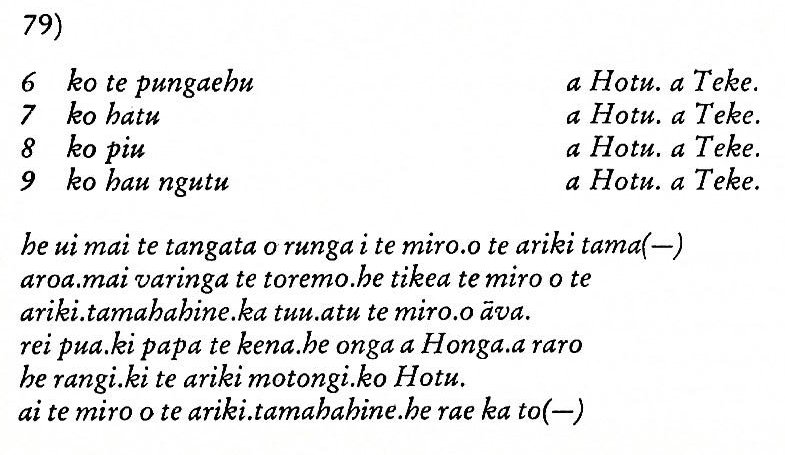

|
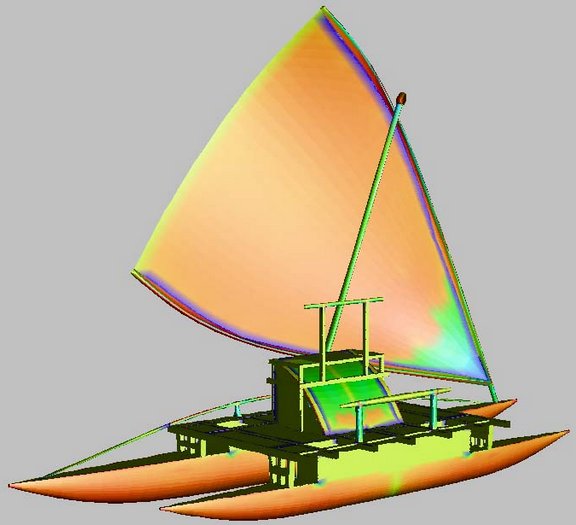 |
|
i te angahuru marima o te raa.o tangaroa
uri.i
te po. |
On the fifteenth day of the month of
October (tangaroa uri), Nonoma
left the house [he ea mai roto i te
hare] during the night [i te po]
to urinate outdoors [ki
kaho.mimi].
At this point Ira called out [he
rangi] to Nonoma, 'Look at the
canoe!'
Nonoma ran [he tahuti], he
quickly went to Te Hiringa Heru (a
ravine in the side of the crater Rano
Kau) and looked around. There he saw the
double canoe way out near the (offshore)
islets [i te motu o haho], and
the two (hulls of the canoe) were lashed
together. |
|
ana.he ea a
Nonoma.mai roto i te hare.ki kaho. |
|
mimi.he
rangi mai a Ira.kia Nonoma.e ui tau
mi(-) |
|
ro.he
tahuti he oho.a Nonoma.he onga i te
hikinga |
|
heru.i ka
ui atu nei ko te miro.i te motu o haho.e |
|
hakapiri ro a.ārurua. |
|
Evidently a pair of wovels close
together was here written as e.g.
poō no =
po-ono (6 nights) and
ārurua =
a aru-rua (a pair held
firmly).
Aru. Áruáru, reduplication of
aaru: to grab firmly. Vanaga. 1.
To pursue. P Mgv.: aruaru, to run
after, to chase, to follow. Ta.:
aruaru, to pursue. 2. To raise in
waves, undulation. P Pau.: puhigaru,
a bubble of water. Mgv.: garu,
foam, froth. Mq.: naú, waves.
Ta.: aru, billow, wave, flood. 3.
(haruharu). Churchill. |
|
Nonoma was out fertilizing Mother
Earth in night number 288
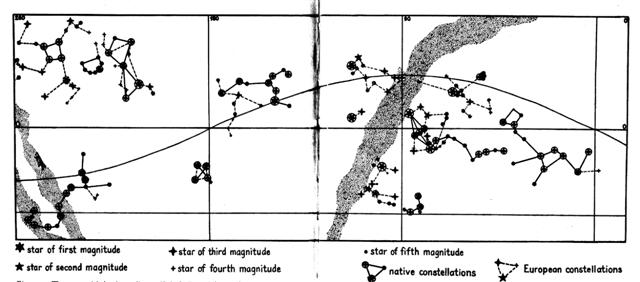
and to convert this to daytime we
ought to reduce with 183 (= 366 / 2),
which leads us to day 105 (April 15).
And by adopting the positions of the
stars in the year 1582 AD we will find
ºApril 15
at Alrisha (the Knot, α Piscium).
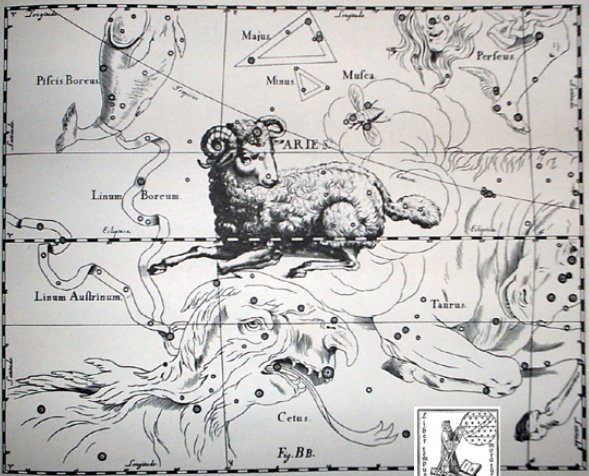
|
JULY 2 |
3 (*104) |
4 (740 / 4) |
 |
 |
 |
|
Ga4-20 |
Ga4-21 (8 * 13) |
Ga4-22 |
|
CLOSE TO THE SUN: |
|
11h (167.4)
χ Leonis, χ¹ Hydrae (167.1),
χ² Hydrae (167.3)
*167.4 - *41.4 = *126.0
|
AL SHARAS (The Ribs)
= β Crateris
(168.6) |
Al
Zubrah-9 (Mane) /
Purva Phalguni-11 (First
Reddish One -
Fig Tree)
ZOSMA
(Girdle, not Belt) = δ
Leonis
(169.2),
COXA
(Hips) = θ Leonis
(169.4)
*169.4 - *41.4 = *128.0
|
|
... God
created Eve from one of
Adam's ribs ('reefs') and
therefore I at first tried
to translate the female (β)
star name Al Sharas
with The Rib. Although
according to Allen this star
was plural: '... β
... was one of Al Tizini's
Al Sharāsīf,
the Ribs, - i.e. of the
Hydra, - and the first of
the set.' Adam had, as I
remember it, another wife
before Eve, viz. Lilith
...
 |
|
Sept 4 |
5 (248 = 104 + 144) |
6 (185 + 64 = 249) |
|
°Aug 31 |
°Sept 1 |
2 (245) |
|
'Aug 8 (*140 = *167 - *27) |
9 |
10 (222 = 185 - 27) |
|
"July 25 (*126) |
26 |
27 (144 = 185 - 41) |
|
DAY 167 |
168 (= 24 * 7) |
169 |
|
|
he tahuti
he hoki mai ki mua ki te hare.he tuu he
rangi.a |
He ran and returned [he tahuti he
hoki] to the front of the house [ki
te mua ki te hare]. He
arrived and called [he tuu he rangi]
into the house [a roto i te hare],
'Hey you! This canoe has arrived during
the night without our noticing it!'
Ira asked [he ui] Nonoma,
'Where is the canoe, which you say is
lying out there (in the water)?'
Nonoma's voice [te reo] came
back [he hakahoki]: 'It is out
there (in the water) close to the
(offshore) islets! There it lies [e
noho mai nei], and the two (hulls)
are lashed together.' |
|
roto i te
hare.he ro korua ē.ku mou mai era ā tau
miro |
|
nei.i anga
po.ana.he ui mai a Ira.kia Nonoma.ihē
tau |
|
miro.e noho
mai ena.he hakahoki mai te reo o
Nonoma.e |
|
i te motu o
haho.e noho
mai nei.e hakapiri ro ana.eruā |
|
miro. |
|
he ea.ā(corrected
to haho
from
oono)
.he too
i te raupā rapu. |
The four of them (corrected for 'the six
of them') went out and picked up [he
too] leaves (on branches) to give
signals.
They picked them up, went and arrived
at Te Hikinga and saw the canoe.
Ira remained at the house [i roto
ana i te hare a Ira] after the four
(corrected for 'the six') had gone [i
oho era] to Te Hikinga Vae (sic). |
|
he mau he
oho.hetu(-) |
|
u.ki te
hikinga.he ui i te miro.i roto ana i te
hare a Ira. |
|
i oho era.ā
(corrected to
haho
from
oono)
ki te hikinga vae. |
|
Haho. Outside. Vanaga.Ha.
1. Four. 2. To breathe. Hakaha'a,
to flay, to skin. Vanaga.
1. Four. P Mgv., Mq., Ta.: ha,
id. 2. To yawn, to gape. 3. To heat. 4.
Hakaha, to skin, to flay;
unahi hakaha, to scale fish. Mgv.:
akaha, to take to pieces, to take
off the bark or skin, to strip the
leaves off sugarcane. 5. Mgv: ha,
sacred, prohibited. Mq.: a, a
sacred spot. Sa.: sa, id.
Churchill. Ho. 1. Ho!, Oh! 2.
Lest, on the point of. 3. To deliver, to
give up. Churchill.
Hiki. To flex the knees
lightly, as used to do the youths of
both sexes when, after having stayed
inside for a long period to get a fair
complexion, they showed themselves off
in dances called te hikiga haúga,
parading on a footpath of smooth stones,
with their faces painted, lightly
flexing their knees with each step.
Vanaga. Tail fin G (? hiku).
Churchill. Hiki kioe (Cyperus
vegetus), a plant whose roots were eaten
during times of famine and the stems of
which were used for medicinal purposes.
Barthel 2. Pau.: Hiki. 1. To
fondle. Mgv.: hiki, to dandle.
Ta.: hii, id. Mq.: hiki,
id. 2. To flee. Mq.: hiki,
flight. Pau.: Fakahihiu, to scare
away, Ma.: whiu, to drive.
Churchill. Mgv.: Hiki, to
commence or to finish mat weaving. Mq.:
hiki, to finish mat weaving.
Churchill. ... The
brothers of Maui sat trembling in the
middle of the canoe, fearing for their
lives. For now the water was frothing
and heaving, and great hot bubbles were
coming up, and steam, and Maui was
chanting the incantation called Hiki,
which makes heavy weights light
...
Heu.
Offspring of parents from two
different tribes, person of mixed
descent, e.g. father Miru, mother
Tupahotu. Heuheu, body
hair (except genitals and armpits).
Vanaga. 1. Heheu; ivi heheu,
the cachalot, bone needle; hakaheu,
spade, to shovel, to grub up, to scratch
the ground, to labor; rava
hakaheu, laborious, toilsome. 2.
Hakaheu, affair. Churchill. M.
Heu, to separate, to pull asunder;
the eaves of a house; heu, a
single hair; hau. to hew; heru,
to comb; huru, hair on the body;
down; feathers; maheu, scattered;
maheuheu, shrubs; mahuru,
scrub; heuea, to be separated.
Text Centre.
Nonoma ran, he quickly went to Te
Hikinga Heru (a ravine in the side
of the crater Rano Kau) and
looked around. There he saw the double
canoe way out near the (offshore)
islets, and the two (hulls of the canoe)
were lashed together.
Vae.
Va'e: Foot, leg; te va'e
mata'u, te va'e maúi, right foot,
left foot. Va'e ruga, va'e raro,
quick and light, without detour (lit.:
foot up, foot down). Ka-oho koe ki a
nua era va'e ruga va'e raro, ina ekó
hipa-hipa, hurry straight to your
mother, do not make any detours. Va'e
pau, misshapen foot, clubfoot.
Vae, to choose. Vaega,
middle, centre; i vaega o, in the
middle of. Vanaga. 1. Foot, paw, leg,
limb; vae no roto, drawers;
karikari vae, ankle. P Pau.:
vaevae, foot, leg. Mgv.: vaevae,
id. Mq.: vae, id. Ta.: vaevae,
avae, id. 2. Pupil. 3. To choose,
elect, prefer, promote, vote; vavae,
to destine, to choose; vaea (vae
2), pupil. Vaeahatu (vae 1
- ahatu): moe vaeahatu, to
sleep sprawling with legs extended.
Vaega, center, middle, within, half;
o vaega, younger; ki vaega,
among, between, intermediate. P Pau.:
vaega, the middle. Mgv.: vaega,
center, middle. Mq.: vaena,
vavena, vaveha, id. Ta.:
vaehaa, half. Vaehakaroa (vae
1 - roa): moe vaehakaroa,
to sleep with legs stretched out.
Vaehau (vae 1 - hau
3), pantaloons, trousers. Vaeherehere
(vae 1 - here 1), to
attach by the paw. Vaerere (vae
1 - rere 1), to run. Churchill.
Ta.: 1. Timbers of a boat. Ha.: wae,
knees, side timbers of a boat. 2. To
share out. Sa.: vae, to divide,
to share. Ma.: wawae, to divide.
Churchill. |
|
8 weeks |
CHRISTMAS EVE |
181 |
ST JOHN'S DAY |
5 |
SIRIUS |
43 |
AUG 12 (224) |
|
SITULA |
Aug 27 |
Sept 2 (245) |
Oct 15 (288) |
|
230 = 2 * 115 (→
Mercury) |
|
232 = 8 * 29 (→
Mercury) |
*342
(Situla) - *165 (Alkes) =
*177 = *354 / 2. Therefore
another 6 days had to be
given to the Sun King
(because 366 / 2 = 183). The
journey of the Explorers
(planets) was in the night
and their 38 nights had to
be extended with 6 days in
order to give the
double-canoe of the Sun the
necessary time-space.
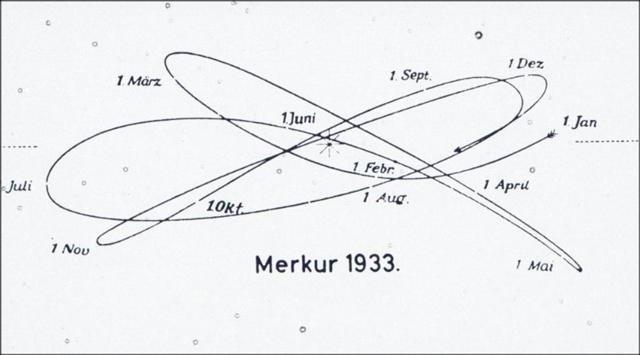
... Ganz ähnlich is der Name
'Gott von Duazag' des
Gottes Nabū ... zu
erklären.
Er bezeichnet ihn als den
Gott des Wachtstums, welches
als aus dem Osten stammend
betrachtet wird, weil die
Sonne, die das Wachstum
bringt, im Osten aufgeht.
Dass aber Nabū als
Ost-Gott aufgefasst wurde,
hängt damit zusammen, dass
sein Stern, der Mercur, nur
im Osten oder Westen
sichtbar ist ...
|
|
E:76 |
|
he noho.he
hakatopa.i te kī.āhaha. he kī ahaha |
The four sat down [he
noho] and pondered [he
hakatopa] over the report [i
te kī] (of the result of the
explanation). Then the four said [he
kī
ahaha], 'One has to get up [ka
ea.etahi] and let the king
know the news (about the conditions on
Easter Island)!'
Raparenga [the Moon] got up, picked
up the leaves, took them in his hands,
and waved, waved, waved, [waved,] and
waved. |
|
ka ea.etahi
ka rapu.ka hakamaa.ki te ariki. i te |
|
kī.he ea.a
Raparenga.he too mai i te raupa.he |
|
mai ki te
rima.he rapu he
rapu he rapu he rapu |
|
he rapu.he
tikea e te tangata.hakamaa ki te rapu. |
|
...
Nut, whom the Greeks sometimes
identified with Rhea, was goddess of the
sky, but it was debatable if in
historical times she was the object of a
genuine cult. She was Geb's twin sister
and, it was said, married him secretly
and against the will of Ra. Angered, Ra
had the couple brutally separated by Shu
and afterwards decreed that Nut could
not bear a child in any given month of
any year. Thoth, Plutarch tells us,
happily had pity on her. Playing
draughts with the Moon, he won in the
course of several games a seventy-second
part of the Moon's light with which he
composed five new days. As these five
intercalated days did not belong to the
official Egyptian calendar of three
hundred and sixty days, Nut was thus
able to give birth successively to five
children: Osiris, Haroeris (Horus), Set,
Isis and Nepthys
...
The repeated wavings
(waves) presumably were referring to
the 'reef' where the Sea was
breaking (ranu) - where Land
(like Venus) was being born.
|
|
he onga a
raro.he rangi ki te ariki.penei e rapu
mai |
This was seen by the man who understood
signals; he looked down and called out
the following to the king: 'They are
waving, they are signaling the following
message: The land is bad; the shoots
growing out of the ground cannot spread
because the algae-like thicket is vry
long when it is pulled out, when it is
ripped out (this means that the runners
of the yam roots that were planted are
unable to prevail against the heavy
weeds, which hve to be pulled out
continually).' |
|
era.e
hakamaa mai era.i te kī hoōu. penei ē. |
|
kainga
kino.kahukahu
o hēke.rimurimu roroa. |
|
mai te
unu mai te
unu. |
|
Kino. 1. Bad; kikino, very
bad, cursed; kona kino, dangerous
place. 2. blemish (on body). Kinoga,
badness, evil, wickedness; penis.
Kinokino, badly made, crude: ahu
kinokino, badly made ahu, with
coarse, ill-fitting stones. Vanaga. 1.
Bad, wrong. T Pau.: kiro, bad,
miserable. Mgv.: kino, to sin, to
do evil. Mq.: ino, bad,
abominable, indecent. Ta.: ino,
iino, bad, evil; kinoga (kino
1) sin; Mgv.: kinoga, sin, vice.
2. A skin eruption, verruga, blotched
skin, cracked feet T. Churchill.
Heke. (Heke),
hakaheke, to pull down, to
overthrow. Mgv.: akaeke, to
overthrow, to vanquish; heke, to
fall down, to fall to pieces: akaheke;
akahekeheke, to demolish. Mq.:
heke, to crumble, to fall down;
hakaheke, to demolish, to pull down.
Churchill. Kai heke, hakaheke,
to deflower.
Kahukahu o heke, an octopus
hiding in his ink.
Mq.: ve'eve'e
'tentacules du heke'. Barthel 2.
Pau.: Heke, to purge. Mgv.:
heke-toto, hemorrhage. Ta.: hee,
to purge. Mq.: heke, to drip.
Ma.: heke, id. Pau.: Hekeheke,
elephantiasis. Ta.: feefee, id.
Mq.: fefe, id. Sa.: fe'efe'e,
id. Mgv.: Heke, eke,
octopus. Ta.: fee, id. Mq.:
heke, feke, fee, id.
Sa.: fe'e, id. Ma.: wheke,
id. Ta.: Hee, to slide, to swim.
Sa.: se'e, to slide, to shoot the
breakers. Ha.: hee, id. Mq.:
Hee oto, to cut. Sa.: sele,
id. Ha.: helehele, id. Churchill.
Ma.: 1. Migrate. Islands of History. 2.
Rafter. Starzecka.
Unu.
1. To drink; unuga,
the act of drinking. 2. To pull weeds,
grasses. 3. To pluck; ka-unu te
huruhuru o te moa! pluck the
chicken's feathers! Únu-únu, to
bask in the sun (ki te raá), to
warm oneself by the fire (ki te ahi
). Vanaga. To drink, liquor.
Unuga, to drink. Hakaunu, to
slake thirst. Hakaunuora, to
water. P Mgv.: unu, to drink.
Mq., Ta.: inu, id. Unuvai,
to drink water; hipu unuvai,
drinking glass. Churchill. |
|
he rangi
mai te ariki.a Hotu.kia Tuki.ka rapu |
King Hotu called [he rangi] to
Tuki, 'Signal and answer [ka rapu
koe.ka hakahoki] the following:
The homeland is bad too, (because there)
the flood [tau ua] brings
destruction and the low tide [tai
papaku] brings relief (this is a
reference to the losses cused in Hiva by
the rising of the water, or rather, by
the subsidence of the land).' |
|
koe.ka
hakahoki.penei ē. kainga kino hoki.tau
ua |
|
ka
okooko.tai papaku ka ora. |
|
... There exists a surprisingly
developed terminology for distinguishing
the phases of the tides: tai pâpaku,
low tide; ku-gúgú-á te tai,
tide at his lowest, literally 'the sea
has dried up'; he-ranu te tai,
when the water starts rising again; this
is a strange expression, since ranu
means 'amniotic liquid,' the
breaking of the waters which precedes
birth; in this phase of the tides the
fish start coming out of their hiding
places and swim to the coast in search
of food; tai hahati, rising tide;
tai hini hahati, tide as it
continues rising; tai u'a, tai u'a
parera, when the tide has reached
its high; tai hini u'a, tide all
throughout its full phase; tai hori,
tide as it starts receding; tai ma'u,
tide during its decreasing phase,
right until it becomes tai pâpaku
again; tai raurau a riki, the
slight swell, or effervescence of the
sea at a change of the moon ... |
|
ku tuu ana
a Ira.raua ko (Ng)a tavake. |
(In the
meantime) Ira and Nga Tavake had
arrived. |
|
he rapu.mai
a Tuki.he hakahoki mai i te kī.penei. |
Tuki signaled and answered the message
in this manner - he waved and waved.
The signal arrived up (at the cliffs)
where Raparenga was. He looked out and
watched for it. Then the waving stopped
(?). |
|
ē.he rapu
he rapu.he iri atu te rapu.a Rapa(-) |
|
renga.he ui
mai ku tikea ana.he
topa.he
rapu. |
|
Topa.
1. To bend down, to drop to
the ground; to fall on a certain date.
2. To stop doing something, to drop;
ina ekó topa taau aga, do not stop,
keep doing your work. 3. To remain, to
be left over, to be unfinished; he
topa te kai, the food is not
finished, there is some left. 4. To come
to one's memory; i te aamu he topa te
vânaga tûai, in the legends old
words come to memory. 5. To remember, to
reflect (with mana'u as subject);
e-topa rivariva tokorua mana'u ki te
me'e nei, let the two of you think
carefully about this thing. Vanaga. 1.
Wine; topa tahaga, id. 2. To fall
in drops, to descend, to go down, to
abdicate; topa iho, to fall;
hakatopa, to knock down, to cause to
fall; hakatopa ki raro, to knock
down, to subjugate. 3. Childbirth,
abortion; topa te poki, to lie
in. 4. A feast, to feast. 5. To arrive,
to result; topa rae, newcome;
topa iho, to come unexpectedly;
topa ke, to deviate; topa no mai,
topa hakanaa, topa tahaga,
mau topa pu, unexpected; topa
okotahi, solitary; hakatotopa,
to excite, to foment. 6. Bad, low,
cheap, failure; igoa topa,
nickname; ariga topa, sinister,
sly, ill-tempered, to hang the head;
hakatopa, to disparage;
hakatotopa, irresolute. 7. (Of
upward movement) topa ki raro, to
scale, to surpass; hakatopa ki te ao,
to confer a dignity; hakatopa ki te
kahu, to spread a sail;
hakatotopa, to make a genealogy.
Churchill. |
|
E:77 |
|
he ui a
Ira.heaha.te ua.ka
rapu mai era.he ki mai |
Ira asked [he
ui a Ira], 'Why [heaha]
did they send signals?' |
|
he kī a
Ira.kia Raparenga.ka rapu koe.ka
hakamaa.pe(-) |
Ira said [he kī a Ira]
to Raparenga, 'Give signals [ka
rapu koe] and tell this [ka
hakamaa.penei]: If the canoe
continues [ana oho.te miro] to
the right side [a te rara mata'u]
(of Easter Island, seen from Motu Nui),
they should sail way out [a haho ana
ana oho] because of Tama, an evil
fish with very long nose [he ika
kino.he ihu roroa] (this is a
wordplay with the place name on the
southeastern shore, which 'demands bad
victims because of his cliffs').' |
|
nei ē.ana
oho.te miro a te rara matau.a haho ana |
|
ana oho.ko
tama he ika kino.he
ihu
roroa.he rapu. |
|
Kino. 1. Bad; kikino, very
bad, cursed; kona kino, dangerous
place. 2. blemish (on body). Kinoga,
badness, evil, wickedness; penis.
Kinokino, badly made, crude: ahu
kinokino, badly made ahu, with
coarse, ill-fitting stones. Vanaga. 1.
Bad, wrong. T Pau.: kiro, bad,
miserable. Mgv.: kino, to sin, to
do evil. Mq.: ino, bad,
abominable, indecent. Ta.: ino,
iino, bad, evil; kinoga (kino
1) sin; Mgv.: kinoga, sin, vice.
2. A skin eruption, verruga, blotched
skin, cracked feet T. Churchill.
Ihu. 1. Nose; ihu more,
snub nose, snub-nosed person. 2.
Ihuihu cape, reef; ihuihu -
many reefs, dangerous for boats. 3.
Ihu moko, to die out (a family of
which remains only one male without
sons); koro hakamao te mate o te
mahigo, he-toe e-tahi tagata nó, ina
aana hakaara, koîa te me'e e-kî-nei:
ku-moko-á te ihu o te mahigo, when
the members of family have died and
there remains only one man who has no
offspring, we say: ku-moko-á te ihu o
te mahigo. To disappear (of a
tradition, a custom), me'e ihu moko o
te tagata o te kaiga nei, he êi, the
êi is a custom no longer in use
among the people of this island. 4.
Eldest child; first-born; term used
alone or in conjunction with atariki.
Vanaga. 1. Nose, snout, cape T (iju
G). Po ihuihu, prow of a canoe. P
Pau.: ihu, nose. Mgv.: ihu,
nose; mataihu, cape, promontory.
Mq., Ta.: ihu, nose, beak,
bowsprit. Ihupagaha, ihupiro,
to rap on the nose, to snuffle. 2. Mgv.:
One who dives deep. Ta.: ihu, to
dive. Churchill. Sa.: isu, nose,
snout, bill. Fu., Fakaafo, Aniwa,
Manahiki: isu, the nose. Nuguria;
kaisu, id. Fotuna: eisu,
id. Moiki: ishu, id. To., Niuē,
Uvea, Ma., Ta., Ha., Mq., Mgv., Pau.,
Rapanui, Tongareva, Nukuoro:
ihu,
id. Rarotonga: putaiu,
id. Vaté: tus,
id. Viti: uthu,
nose. Rotumā: isu,
id. ... usu
and ngusu
... serve as transition forms,
usu
pointing to isu
the nose in Polynesia and
ngusu
to ngutu
the mouth, which is very near, nearer
yet when we bear in mind that
ngutu
the mouth is snout as well and that
isu
the nose is snout too ... Churchill 2.
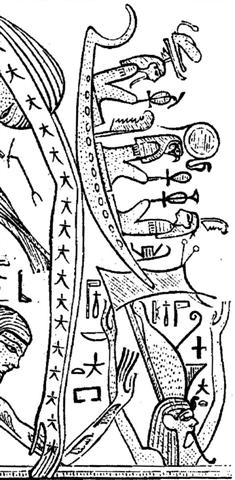
... string games
could be resumed after it was clear that
the Sun had managed to leave the horizon
and was rapidly gaining in altitude:
'Before the sun starts to leave the
horizon ... when it shows only on the
horizon, ... then string games were no
longer allowed as they might lacerate
the sun. Once the sun had started to go
higher and could be seen in its
entirety, string games could be resumed,
if one so wished. So the restriction on
playing string games was only applicable
during the period between the sun's
return and its rising fully above the
horizon
...
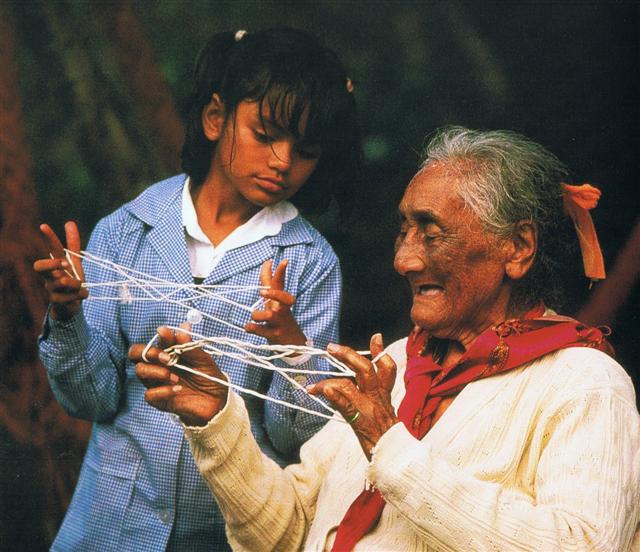 |
|
he rapu.he
rapu.he tikea e runga e te miro. |
He waved, waved, waved [?], and waved.
The one on board the boat saw [he
tikea e runga e te miro] Raparenga's
waving [te rapunga.o Raparenga]
and understood. The signals arrived [he
angiangi] on board the canoe [he
iri mai te rapu o runga i te miro];
the waving arrived below [he topa ki
raro.te rapu] (i.e.. in the west).
[(Here they) died out, he oti.] |
|
te
rapunga.o Raparenga.he angiangi.he iri
mai te rapu |
|
o runga i
te miro.he topa ki raro.te rapu.he
oti. |
| (crossed
out: he ki a Hotu) |
he ki a Hotu |
| |
The two
hulls were no longer kept lashed
together (i.e., they were separated for
the rest of the journey). |
|
Oti.
To come to an end; to
suffice, to be enough: ku-oti-á,
it is finished; ina kai oti mo kai,
there is not enough to eat;
he-oti á, there isn't anymore left,
it's the last one; it's enough with
that. Vanaga. Ta.: 1. Oti,
presage of death. Sa.: oti, to
die. 2. To cut. Mq.: koti, oti,
id. Sa.: 'oti, id. Ma.: koti,
id. Churchill.
The nakshatra system works with a
pair - the Sun on one side and the Full
Moon (Hotu) on the other. In the
night the Full Moon can be observed
where the Sun is not. When late after
midnight the Full Moon has reached the
horizon in the west (ki raro) it
implies the Sun is on its way up in the
east. |
|
he rangi a
Hotu.ki te miro o te ariki tamahahine. |
Hotu called out [he rangi] to the
canoe of the queen [te aríki
tamahahine]:
'Steer the canoe to the left side [a
te rara maúi] when you sail in. Teke
will jump over on board (your) canoe to
work his mana [hakamanamana]
when you sail [mo oho.atu]
through the fishing grounds [i te
hakanononga]!'
[I will go (koau ma oho) to
the right (a te rara mata'u),
working mana (mo hakamanamana)
when going through the fishing grounds (mo
oho atu i te hakanononga).]
Teke jumped on board the second [he
teki.a Teke.ki runga ki te rua]
canoe, (that) of the queen.
The king's canoe [te miro o te
ariki. tamaaroa] sailed to the
right, the queen's [to te ariki.
tamahahine] to the left. |
|
a te rara
maui.tou miro ana oho.koe.ko Teke.mo |
|
teki atu.ki
runga ki tou miro ena. mo |
|
ka
hakamanama- |
|
na mo
oho.atu i te hakanononga.koau ma oho. |
|
a te rara
matau.mo hakamanamana mo oho. |
|
atu i te
hakanononga.he teki.a Teke.ki runga ki
te rua |
|
E:78 →
Rigel (Foot) & Capella (Mother Goat) |
|
miro. o te
ariki. tamahahine. |
|
he oho. te
miro o te ariki.
tamaaroa.a te rara matau |
|
he oho, to
te ariki.
tamahahine a te rara maui |
| Matua
tamaroa, father; matua tamaahine, mother.
Ha. 1. Four. 2. To breathe. Hakaha'a, to
flay, to skin. Vanaga. 1. Four. P Mgv., Mq., Ta.:
ha, id. 2. To yawn, to gape. 3. To heat. 4.
Hakaha, to skin, to flay; unahi hakaha, to
scale fish. Mgv.: akaha, to take to pieces, to
take off the bark or skin, to strip the leaves off
sugarcane. 5. Mgv: ha, sacred, prohibited. Mq.:
a, a sacred spot. Sa.: sa, id. Churchill.
Roha. Mgv.:
roha, the corner of a house. Mq.: oha,
koha, a transverse joist to brace the rafters. Ha.:
loha, the trimming of the corners and ridges of a
house. Churchill.
Ua uhi 'ia kō lāua mau mana'o i ke aloha, their
thoughts were overwhelmed with love. |
|
Counting from Rigel and
Capella (*78) to Zosma and Coxa (*169)
we will find a quarter of a year. The
separation of the pair of hulls occured
at different stars depending on where
the precession (the Fox) had moved the
Sun.
|
JULY 4 (184) |
Zosma & Coxa |
|
June 7 (158) |
Rigel & Capella |
|
184 + 16 - 158 = 42 →
Bharani |
|
|
a Hanga.i
hakamanamana i te hakanononga. |
Honga
[surely it ought to be Hanga] worked his
mana in the fishing grounds. |
Haga. 1. Bay,
fishing spot. (Figuratively)
he haga o te ákuáku, it is the
[evil] spirit's fishing spot, i.e. a
place where they hide waiting for people
to fall under their power. 2. To want,
to love. Ku haga á i te vai, I
want water, I am thirsty. Vanaga. 1.
Bay, strait, anchorage, strand, beach. P
Mq.: hana, haka, small
bay, creek, cove. 2. Work, labor,
employment, act, affair, creation,
design, state, maker, fashion,
manufacture, occupation, profession; to
do, to make, to construct, to employ, to
form, to manufacture, to fashion, to
found, to be busy with; haga rakerake,
crime; tagata haga ei mea,
mercenary; haga no iti, to plot
mischief; haga ke, to act
contrary; haga takataka, to
disjoin; haga nui, difficulty,
fatigue, to weary; tuhi ki te haga,
to give employment; haga hakahou,
to make over, to renew, recovery;
haga koroiti, to deal prudently;
haga nuinui ke, to overburden. P
Pau.: haga, to do, action, work,
a deed. Mgv.: haga, aga,
work, labor. Mq.: hana, haka,
action, act, work, occupation. Ta.:
haa, work, to labor, to make. 3.
Agreement, conduct, liking, intention,
desire, will; to resolve, to permit, to
endeavor, to tolerate, to be willing, to
wish, to approve; haga ihoiho,
fixed desire; haga mai, haga
no mai, to agree, to hearken
favorably; tae haga, despite,
involuntary, to refuse, to renounce;
noho hakahaga, apathy. 4. = haka.
Pau.: haga = haka. 5.
Mgv.: haga, a fish. Mq.: haka,
id. 6. Mgv.: haga, a fishtrap.
Sa.: faga, a fish-trap,
bird-cage. Ma.: hanganoa, a small
basket for cooked fish. 7. Mgv.: haga,
a measure of a fathom. Ta.: aa,
to measure length. Mq.: aka,
ana, to measure with the arms. Ma.:
whanga, id. Churchill. Hagaava
(haga 1 - ava 2), entrance
of a harbor. Hagahaga: 1. (haga
2), work. 2. hesitation, to hesitate.
Churchill.
288 + 26 = 314, and
at the time of rongorongo this was
41 right ascension days later, viz.
at the solstice:
|
OCT 16 |
17 (290) |
18 (*211) |
 |
 |
 |
|
Ga8-6 |
Ga8-7 (210) |
Ga8-8 |
|
Winnowing Basket-7
(Leopard)
18h (273.4)
*273.4 - *41.4 = *232.0
NASH (Point) = γ
Sagittarii
(273.7),
θ
Arae (273.8) |
ZHŌNGSHĀN =
ο Herculis
(274.0),
π Pavonis (274.6) |
ι Pavonis (275.1),
POLIS = μ Sagittarii
(275.9)
MENKAR (α Ceti)
|
|
Dec
19
(*273 = 364 * ¾) |
20 (354 = 12 * 29½) |
SOLSTICE |

...
As has already been
mentioned, the Delphians
worshipped Dionysus once
a year as the new-born
child, Liknites,
'the Child in the
Harvest Basket', which
was a shovel-shaped
basket of rush and osier
used as a harvest
basket, a cradle, a
manger, and a
winnowing-fan for
tossing the grain up
into the air against the
wind, to separate it
from the chaff. The
worship of the Divine
Child was established in
Minoan Crete, its most
famous early home in
Europe. In 1903, on the
site of the temple of
Dictaean Zeues - the
Zeus who was yearly born
in Rhea's cave at Dicte
near Cnossos, where
Pythagoras spent 'thrice
nine hallowed days' [27]
of his initiation - was
found a Greek hymn which
seems to preserve the
original Minoan formula
in which the
gypsum-powdered,
sword-dancing Curetes,
or tutors, saluted the
Child at his birthday
feast. In it he is
hailed as 'the Cronian
one' who comes yearly to
Dicte mounted on a sow
and escorted by a
spirit-throng, and
begged for peace and
plenty as a reward for
their joyful leaps ... |
|
°Dec 15 (*269) |
16 (350) |
17 |
|
'Nov 22 (*246) |
23 |
24 (328) |
|
"Nov 8 (*232) |
9 |
10 (314) |
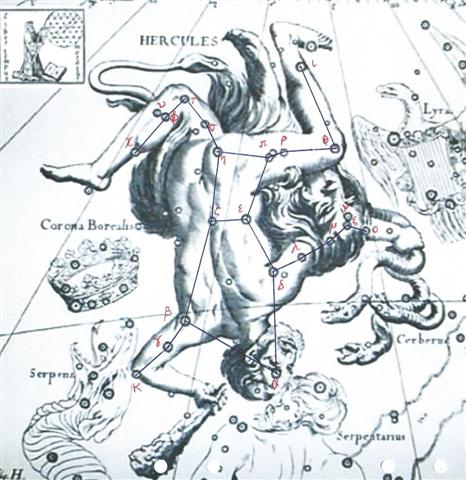 |
Whereas 288
("October 15) + 78 = 366 ("January
1) = 314 + 2 * 26.
'One never knows what one treads
underfoot' → Rigel (*78, the Foot of
Orion)
→ *62 (Beid) + *16.
|
Counting
the
tresses
of
Pachamama
(the
World
Mother)
from
right
to
left: |
|
1 |
26 |
78 |
1 |
29 |
90 |
|
2 |
26 |
2 |
30 |
|
3 |
26 |
3 |
31 |
|
4 |
25 |
104 |
4 |
34 |
124 |
|
5 |
26 |
5 |
31 |
|
6 |
27 |
6 |
30 |
|
7 |
26 |
7 |
29 |
|
Total
=
396
=
182
+
214
(= 2
* 91
+ 2
*
16) |
|
The
key
number
78
(= 3
*
26)
equals
288
-
210
(and
also
185
-
107). |
|
July 29 |
Oct 15 |
Jan 1 |
|
210 |
288 |
366 |
|
420 / 2 |
210 + 78 |
210 + 156 |
|
URSA MAJOR |
35 |
HERCULES |
211
|
ERIDANUS |
|
ο (*127 + *183 =
*310) |
ο (*274) |
Beid (*62) |
|
310 + 80 = 390 |
274 + 80 = 354 =
390 - 36 |
62 + 80 = 142 =
390 - 148 |
|
July 26 (207 =
390 - 183) |
146 |
Dec 20 (354) |
May 22 (142 =
354 - 212) |
|
"June 15 (166) |
"Nov 9 (313 =
354 - 41) |
"April 11 (101 =
142 - 41) |
|
18 * 29½ = 166 +
365 = 531 |
678 = 313 + 365
= 300 + 378 |
466 = 101 + 365
=
531 - 65 |
|
 |
 |
152 |
 |
|
Ga3-4 (63) |
Ga8-7 (210) |
Gb5-10 (363) |
|
7-MACAW |
300 = 62 + 365 -
127 |
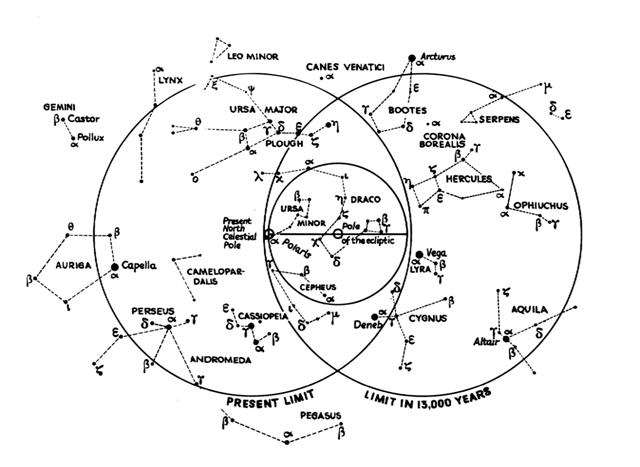
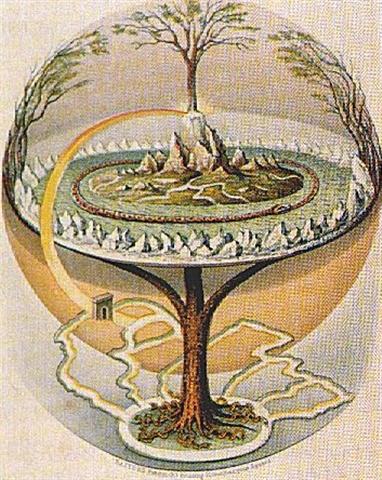
|
|
1 ko te hina. |
a Hotu. a Honga. |
|
2 ko te kana haure. |
|
3 ko koekoe. |
|
4 ko tuu. |
|
5 ko mahatua. |
|
|
a Teke.i
hakamanamana.i te hakanononga.o te rara
maui. |
Teke worked
his mana in the fishing grounds to the
left side. |
|
1 ko piro. |
a Hotu. a Teke. |
|
2 ko pura. |
|
3 ko hatehate. |
|
4 ko uto. |
|
5 ko mata o hotu. |
|
|
E:79 →
northern spring equinox
... Ecclesiastically,
the equinox is reckoned to be on 21
March (even though the equinox occurs,
astronomically speaking, on 20 March in
most years) ... |
|
6 ko pungaehu. |
a Hotu. a Teke. |
|
7 ko hatu. |
|
8 ko piu. |
|
9 ko hau ngutu. |
|
| he ui
mai te tangata o runga i te miro.o te
ariki tama(-) |
The men on board [o runga] the royal canoe looked
out [he ui] from Varinga Te Toremo (the
northeastern cape of the Poike
peninsula).
There they saw [he tikea] the
canoe of the queen, the canoe of Ava Rei
Pua, as it reached [ka tuu] Papa
Te Kena (on the northern shore, east of
Hanga Oteo). |
|
aroa.mai
varinga te toremo.he tikea te miro o te |
|
ariki.tamahahine.ka tuu.atu te miro.o
āva. |
|
rei
pua.ki papa te kena.he onga a Honga.a
raro |
|
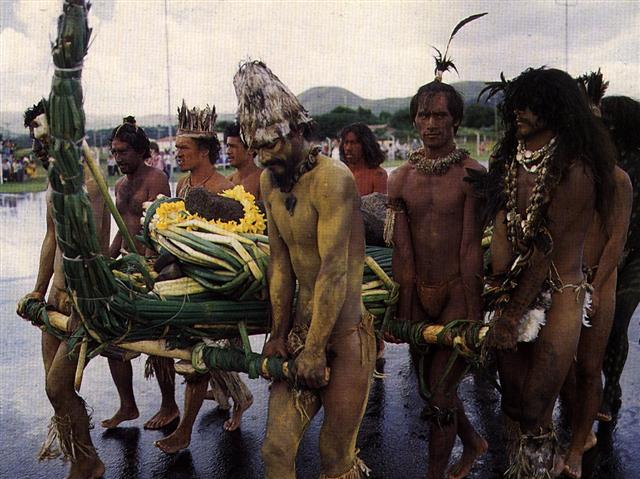
... low down among the other stones in
the wall of Ahu Naunau in
Anakena
[they] found
a crowned head broken off at the neck,
and clearly it was from a stone statue
which headless earlier had been brought
to Norway. For the Easter Islanders the
immediate response to the new discovery
was La Reina! - it just had to be
their ancient queen Avareipua.
Old people cried emotionally ... |
| he
rangi.ki te ariki motongi.ko Hotu. |
Honga came and gazed in the direction
below (i.e., toward the west).
He called out [he rangi] to the
noteworthy ruler (? ariki motongi)
Hotu, 'There is the canoe of the queen!
It will be the first one to land! [he
rae ka tomo era]'
At this news King Hotu replied to
Honga, 'Recite (rutu) (powerful
incantations) as though the ten brothers
of the chief (ariki maahu) were
one whole(?).'
The ten recited with all their might.
[he rutu korua atatahi te angahuru]
This is what they recited [penei i
rutu ai]: 'Let all
movement (? konekone) cease!' [ka hakamau te konekone].
They recited and sailed on swiftly [he
rutu he oho mai]:
Honga, Te Kena, Nuku Kehu, Nga Vavai,
Oti, Tive (corrected for Sive),
Ngehu, Hatu, Tuki, and Pu (corrected
for Bu).
|
| ai te
miro o te ariki.tamahahine.he rae ka
to(-) |
| mo
era.he hakahoki mai te ariki.a Hotu i te
kī. |
| kia
Honga.ka rutu korua
atatahi te angahuru. |
| te ariki
(crossed out: motongi)
maahu.he rutu atatahi te anga(-) |
| huru
penei i rutu ai.ka hakamau te konekone |
| he
rutu
he oho.mai.Ko Honga.ko Te kena.Ko Nu(-) |
| ku
kehu.ko Nga Vavai.ko Oti.ko Sive
(sic!).ko |
|
Ngehu.ko Hatu.ko Tuki.ko Bu
(sic!). |
|
Ata 1. Dawn, first light before
sunrise; ku-hamu-á te ata , dawn
has broken; ku-tehe-á te ata,
it's already dawn (lit.: the lights have
flown). 2. Particle inserted between the
imperative prefix ka and the verb
to signify 'well, carefully,
intelligently': ka-ata-hakarivariva,
prepare it well. Between the prefix
e and kahara it expresses
'to make sure that, to take good care
that...' : e-ata-kahara koe o oona,
be careful not to get dirty;
e-ata-kahara koe o kori te moa o te tahi
pa, be sure not to steal chickens of
another property. 3. More: iti,
small; ata iti, smaller;
he-ata-ata iti-iti ró, the smallest
of all. Vanaga. Âta 1. Shadow:
he-veveri te poki, ana tikea toona âta,
the child is frightened at seeing
his shadow; person's reflection (in
mirror, in water): he âta oou-á,
it's your own reflection. 2. To be
frightened by a shadow: he-âta te
îka, the fish are frightened (and
they flee) by people's shadows. Vanaga.
1. Image, picture, portrait, design; to
draw, to paint (shadow sense). P Mgv:
ata, image, likeness, portrait,
shadow of a human being, form, shape,
appearance, imprint, impression. Mq.:
ata, image, statue, portrait,
shadow, surface; to design, to mark.
Ta.: ata, shade, shadow
appearance, form, representation of an
object, cloud, cloudy. 2. Transparency,
end of day, sunset (bright sense); e
ata, red clouds; ku ata,
transparent; ata mea, ata tea,
ata tehe, dawn, daybreak,
sunrise; ataata, end of day,
sunset. P Mgv.: ata, morning or
evening twilight, daybreak, dawn; ata
haihai, evening twilight, a
beautiful sunset; ataiai,
twilight, clouds red with the sunset;
atakurakura, a beautiful sunrise or
sunset; atareureu, dawn, the
first peep of day, morning twilight.
Mq.: ata, to appear, to rise, to
shine (of stars); ata uá, morning
twilight; ataata, diaphanous,
transparent. Ta.: ata, twilight.
3. A designation of space; ata
hakahohonu, abyss; ata hakaneke
mai, nearby, close at hand; ata
tapa, lateral, marginal. 4 ? Ata
kimikimi, to inquire; ata puo,
to hill a plant; ata ui, to
examine, to taste. Churchill.
Atahenua (ata 3 - henua
1), landscape, countryside. Atakai:
1. Generous, hospitable, beneficent,
indulgent, liberal, obliging;
prodigality, indulgence; rima atakai,
benevolent, generous, open-handed; gift,
liberality. 2. Calm, unperturbed,
grateful. Churchill. Ata-ta T,
evening (? ataata). Atatehe
(ata 2 - tehe 1), dawn;
popohaga atatehe, morning, early in
the morning. Churchill. Tahi.
Other; te tahi tagata someone
else; te tahi hoki... and others
again...; te tahi... te tahi...,
some... others; te tahi atu, the
rest of them. Tahitahi, to scrape
with a sharpened stone. Vanaga. One,
only, simple; te tahi, next; e
tahi, anyone; e tahi no,
unique, unity; e tahi e tahi,
simultaneous. P Mgv.: Mq., Ta.: tahi,
one. Churchill.
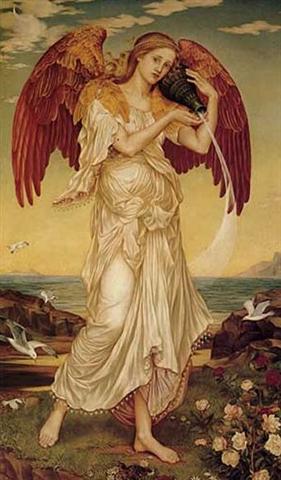 |
The word rutu was evidently used when calling
up (he ragi) to the sky (te ragi).
Rutu.
1. To read, to recite, to pronounce words solemnly;
he-rutu i te kohau motu, to read the
rongorongo tablets; hare rutu rogorogo mo
hakama'a ki te ga poki ite kai, i te rogorogo,
rongorongo school, house in which children were
taught reading and writing the rongorongo signs. 2.
To pelt with stones. 3. To gather in great numbers
(of people). Vanaga. Sound. Rutu-rongorongo =
the sound of recitation. Barthel. T. Beat. Henry. To
recite; tae rutu, irreverence. Churchill.
Pau.: rutu, a drum. Mgv.: rutu, to
beat, to cause to resound. Ta.: rutu, a drum,
to drum. Mq.: utu, to drum. Sa.: lutu,
to shake a rattle. Churchill.
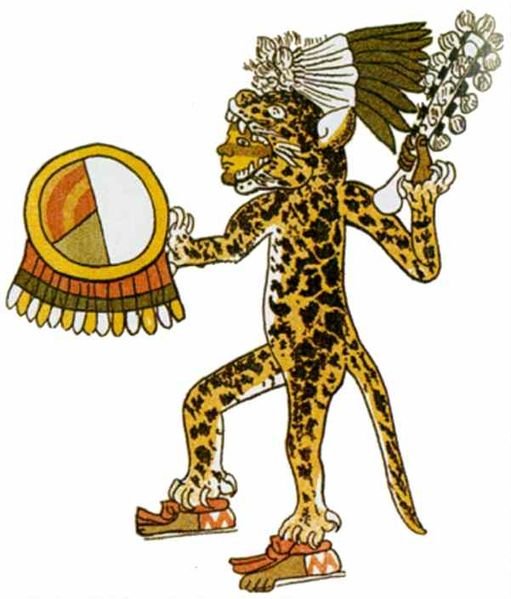
|


















